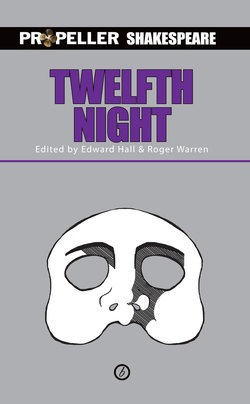Читать книгу Twelfth Night - William Shakespeare - Страница 13
На сайте Литреса книга снята с продажи.
Music in Twelfth Night
ОглавлениеThe opening line of Twelfth Night suggests that music will be important in the play. And the role of Feste, with four whole songs in the text and many other catches and rounds besides, is crucial in leading that music. We decided to use the traditional tunes for his songs, and our job as his ensemble of Zanies was to figure out how to accompany him.
On day one of rehearsals, Edward Hall and Michael Pavelka told us that one of their inspirations for the design of Propeller’s production was the French film, Last Year in Marienbad. When we watched it, we were struck by how the characters in that monochrome world were trapped in repetitive cycles, just as each character in Illyria is trapped in their own behavioural patterns until the shipwrecked twins enter their lives and begin to break the spell.
It occurred to me that musically we could represent this trapped, monochrome world by humming a single note, out of which Feste’s songs like ‘Come away death’ would emerge in a melancholic minor key, with the same cycle of minor chords repeated throughout the play; the effect of the twins on the musical landscape would be gradually to transform this minor atmosphere to the more contented major key of A flat, showing how the whole stagnant world of Illyria is transformed by these two outsiders. This idea formed the basis of most of my vocal arrangements. Our hummed C drone accompanies the opening lines, recurring throughout the play until, during the final song, the building tension of the C minor accompaniment slips away to leave a calm A flat major chord resonating in the theatre. Starting songs with all the cast joining in on a single note also ensures we are all in the same key!
Instrumentally, we were lucky the cast already played various folk instruments – guitars, clarinet, penny whistle, drums, accordion, with some brassy saxophone and a jazzy cello bass line thrown in for Toby and Maria’s mischievous antics. But Edward Hall also wanted to evoke an eerie horror film atmosphere, and we sourced some unusual percussion to achieve this: a piano gut was plucked like a harp, or hit like a drum for thunder during the shipwreck; glasses of water provide a buzzing drone under the Antonio and Sebastian scenes, along with a bottle blown like a distant foghorn; but our piece de resistance (and the instrument audiences always asked about) is the waterphone – a simple but surprisingly costly invention, consisting of a hollow metal cylinder with what looks like two dog bowls soldered on one end to form a container, with lots of thin metal rods of varying lengths protruding up from it: you pour water into the cylinder and bow the rods with a violin bow, whilst swaying the container to move the water around inside; and the resulting sound is all you need to send shivers down people’s spines!
Jon Trenchard
